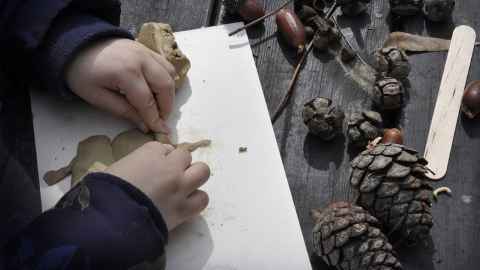Don’t let hope be a casualty of the virus
27 March 2020
Opinion: Imagining our lives will get better again is part of the healing process as a nation, writes Peter O'Connor. Playfulness and creativity will help.

It feels as if everyday life has been cancelled. The joy of coffee in a crowded cafe, the incidental conversations as we move around town, the promise of a night out with mates has been chilled with the arrival of physical isolation. A society fixated on busyness now needs to find meaning and purpose to lives in different ways. Our outer lives have been cancelled. Yet our inner lives are as active as ever. They might, because of the new stillness in the months ahead, need to become even more active.
As we slow our lives because of Covid-19, how we keep our inner lives fresh and nourished will be an important question for us all to answer. Fortunately, creative thinking hasn’t been cancelled, it remains a vital tool for us to survive the current crisis. For parents at home with their children for days on end, creativity will once again demonstrate itself as a great vital coping life skill.
When we engage in the creative process either on our own or with those we are isolated with, we have the chance to notice the ongoing beauty and wonder of the world in which we live. This isn’t some Pollyanna response but a recognition that taking the time to notice that which is still wonderful is vital in times of crisis.
Today I played with my 15-month old granddaughter and marvelled at how the tensions of the current days faded as we laughed together. Playfulness, at the heart of creativity, will be a vital tool in keeping our inner lives intact. In the stress and strain of living together in difficult times, we will need to still be playful, to laugh, to be entirely in the present. From my experience and research with children during and post disaster in many settings over the last ten years, I suggest parents need to understand the most important task they have with children home from schools is not keeping them up to speed with literacy and numeracy. It will be to reassure them they are loved, that life can, despite everything, be full of joy and wonder.
During these coming weeks it will be important to tell children the truth about the threats of the virus without unnecessarily scaring or overly shielding them from reality. This needs to be done while reassuring them that adults are working as hard as they can to make things as good as they can, as fast as they can. It will be important not to promise everything will be all right. As a parent you will want to keep up with the news but having coronavirus-free time as well, diversions from the over bearing situation, will be important for everyone.
Parents will need to answer questions about the virus in age-appropriate language, but also be honest when they don’t know the answer. It’s important for children to learn there isn’t an answer for everything.
Making art with children isn’t for every parent. For many, play will mean kicking or throwing a ball in the yard. That’s important, too, but for those hard questions children have about the world, the arts provide a process for them to think and express their worries and fears in ways words simply can’t do on their own. Making art together as parent and child is an invaluable way to connect and establish fresh relationships.In the distraction of being busy with our hands, deliberate “accidental” talk allows us to talk openly about feelings and fears.
We are all worried about the present, so much so it’s hard to imagine how in the future we might return to the past. Dancing, singing, making pretend worlds, painting, drawing, opens us up to imagine the world differently. Imagining our lives will get better is part of the healing process we will all need as a nation, regardless of whether we as individuals or members of our families contract the disease.
And when we do finally come out of these times, it will be the strength of our inner lives that will rebuild our world. Keeping our inner lives alive, bringing joy and play into our homes is all part of how we can make sure hope isn’t a casualty of the virus.
Professor Peter O’Connor is from the Faculty of Education and Social Work.
This article reflects the opinion of the author and not necessarily the views of the University of Auckland.
Used with permission from Newsroom Don’t let hope be a casualty of the virus 27 March 2020.
Media queries
Alison Sims | Research Communications Editor
DDI 09 923 4953
Mob 021 249 0089
Email alison.sims@auckland.ac.nz